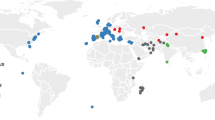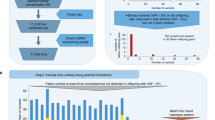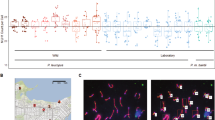Abstract
Restriction fragment length polymorphisms (RFLPs) of maternally inherited mitochondrial DNA have revealed that genetic exchanges can occur between populations, subspecies or even species1–4. From the point of view of population genetics the mammalian Y chromosome represents a genomic analogue of the mitochondrion; it is inherited only paternally and remains perpetually monosomic, showing little meiotic recombination with other chromosomes. Using a Y-specific genomic DNA probe obtained from a flow-sorted mouse Y-chromosome library, we have examined the RFLPs in 10 newly established mouse lines of the European semispecies Mus musculus domesticas and Mus musculus musculus5, and identified two variant forms of the Y chromosome, each of which is characteristic of one of the semispecies. As reported here, probing the DNA from nine established inbred laboratory strains reveals that the strain SJL carries a M.m. domesticus type Y whereas, surprisingly, the Y chromosomes of the other eight strains are of M.m. musculus origin. Hence, these strains cannot be regarded as archetypes of M.m. domesticus as suggested by protein polymorphisms and mitochrondrial DNA sequence data, but rather as genetic hybrids between the two semispecies.
This is a preview of subscription content, access via your institution
Access options
Subscribe to this journal
Receive 51 print issues and online access
$199.00 per year
only $3.90 per issue
Buy this article
- Purchase on Springer Link
- Instant access to full article PDF
Prices may be subject to local taxes which are calculated during checkout
Similar content being viewed by others
References
Palmer, J. D., Shields, C. R., Cohen, D. B. & Orton, T. J. theor. appl. Genet. 65, 181–187 (1983).
Ferris, S. D. et al. Proc. natn. Acad. Sci. U.S.A. 80, 2290–2294 (1983).
Powell, J. R. et al. Proc. natn. Acad. Sci. U.S.A. 80, 492–495 (1983).
Boursot, P. et al. C. r. hebd. Séanc. Acad. Sci., Paris 299, 365–370 (1984).
Bonhomme, F. et al. Biochem. Genet. 22, 275–303 (1984).
Ferris, S. D., Sage, R. D. & Wilson, A. C. Nature 295, 163–165 (1982).
Burgoyne, P. S. Hum. Genet. 61, 85–90 (1982).
Bishop, C. E. et al. Nature 303, 831–832 (1983).
Bishop, C. E. et al. J. molec. Biol. 173, 403–417 (1984).
Guellaen, G. et al. Nature 307, 172–173 (1984).
Baron, B. et al. Expl Cell Res. 152, 220–230 (1984).
Lamar, E. E. & Palmer, E. Cell 37, 171–177 (1984).
Singh, L., Phillips, C. & Jones, K. W. Cell 36, 111–120 (1984).
Altman, P. L. & Katz, D. D. (eds) Inbred and Genetically Defined Strains of Laboratory Animals Pt 1 (Fedn Am. Soc. exp. Biol., Bethesda, Maryland, 1979).
Klein, J. Biology of the Mouse Histocompatibility-2 Complex (Springer, New York, 1975).
Yonekawa, H. et al. Differentiation 22, 222–226 (1982).
Eicher, E. M. & Washburn, L. J. exp. Zool. 228, 297–304 (1983).
Author information
Authors and Affiliations
Rights and permissions
About this article
Cite this article
Bishop, C., Boursot, P., Baron, B. et al. Most classical Mus musculus domesticus laboratory mouse strains carry a Mus musculus musculus Y chromosome. Nature 315, 70–72 (1985). https://doi.org/10.1038/315070a0
Received:
Accepted:
Issue Date:
DOI: https://doi.org/10.1038/315070a0
This article is cited by
-
Effect of the Y chromosome on plasma high-density lipoprotein-cholesterol levels in Y-chromosome-consomic mouse strains
BMC Research Notes (2014)
-
Mosaic variegated aneuploidy in mouse BubR1 deficient embryos and pregnancy loss in human
Chromosome Research (2014)
-
Deconstructing Mus gemischus: advances in understanding ancestry, structure, and variation in the genome of the laboratory mouse
Mammalian Genome (2013)
-
Complex cytogenetic analysis of early lethality mouse embryos
Chromosome Research (2011)
-
The mouse A/HeJ Y chromosome: Another good Y gone bad
Chromosome Research (2008)
Comments
By submitting a comment you agree to abide by our Terms and Community Guidelines. If you find something abusive or that does not comply with our terms or guidelines please flag it as inappropriate.



